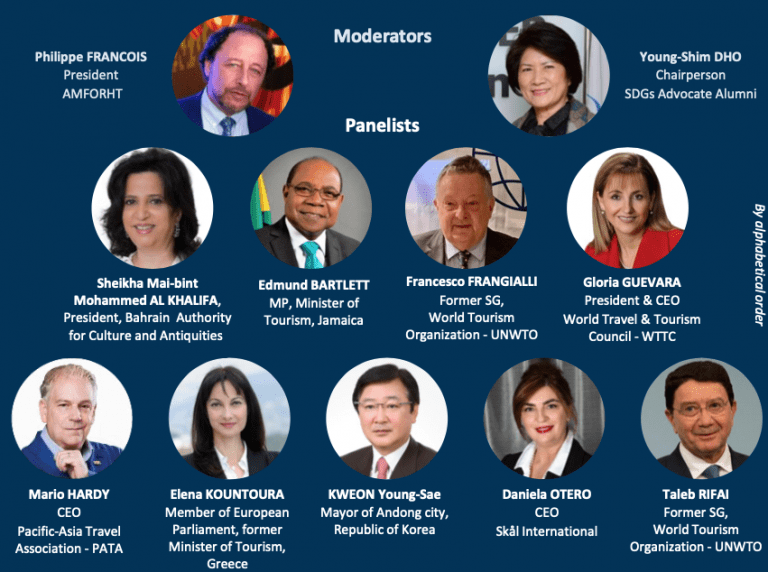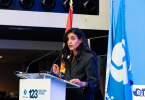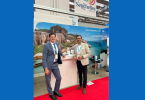South Korea was the proud virtual venue for a high-level virtual event at the General Assembly of Amforth organized by Phillipe Francois, President of Amforht and Ambassador Yo-Shim DHO, Chairperson SDGs Advocate Alumni.
Among the panelists are
- Sheika Mai-Bint Mohammed Al Khalifa, President of Bahrain Authority for Culture and Antiquities, and current candidate for UNWTO Secretary-General
- Gloria Guevara, President and CEO, World Travel and Tourism Council.
- Mario Hardy, CEO, Pacific-Asia Travel Association – PATA
- Elena Kontoura, Member of the European Parliament and former Minister of Tourism, Greece.
- Daniela Otero, CEO Skal International
- Hon. Minister of Tourism Edmund Bartlett, Jamaica
The Jamaica Minister Bartlett provided the following talking points.

- • Good afternoon.
- • Today more than ever, the world has become more vulnerable to extreme climate events, natural disasters, external shocks, terrorism, cyber-crime and pandemics.
- • This vulnerability has increased due to the hyper connectivity created through the sheer volume, speed, and reach of travel. And there has been no better example of this vulnerability than the impact of COVID-19.
- • In March of this year when news broke of a viral outbreak in China, very few of us could have predicted that seven months after, this novel virus would have swept the world and become the most consequential global health crisis of our lifetimes.
- • Over this period, all segments of the global economy have been eviscerated as global populations have been forced to adjust to the ‘new normal’ of restrictions on public assembly, social distancing measures, national lockdowns, daily curfews, work from home orders, quarantines and stay at home orders.
- • The effect of the pandemic on global travel and tourism has naturally been catastrophic, as most countries were forced to
4) Trigger points to tackle action, which includes a planned vision in a world that is learning to evolve rapidly.
• As devastating as this pandemic has been, the reality is that it is unlikely to be the last of this magnitude. A range of threats including climate change and global warming impacts, cyber-crimes and epidemics and pandemics are expected to continue to pose disruptive challenges to global tourism in the future.
• It is the very vulnerability of this global industry and history has shown this with disruptions like SARS, global economic meltdowns and 9/11.
• As a matter of priority, destinations globally will be required to pay historic attention to resilience-building. The sector needs to become more adaptable, resilient and agile.
• This pandemic has presented us with a unique opportunity to transition towards a greener and more balanced tourism as it is anticipated that more international tourists will opt for “sustainable” destinations in the post-covid era.
• With crisis comes the need for adaptability and agility.
• Destinations that fail to reorient themselves towards greater sustainability are likely to be left behind. More tourism products
- will need to be built around health, wellness and the green economy- emphasizing sustainable behaviours and practices by all involved in the tourism value chain from tourists to hotels and other enterprises to local communities.
- • We must promote tourism models that guarantee that the natural and cultural assets are valued and protected, and the intangible cultural heritage of local communities that encourages the flourishing of creativity is safeguarded.
- • It calls for more resilient models of tourism that are in harmony with the environment, safeguards livelihoods and from which local communities’ benefit.
- • The concepts of destination security and attractiveness in the post-covid era will increasingly emphasize health and safety standards. Traditional laissez faire tourism, that has played into the demand for care-free socializing and experiences, will be increasingly substituted by new tourism models that balance health and safety requirements with fun and recreation.
- • To achieve this equilibrium, we expect to see more hotels, cruise ships, restaurants and tour operators upgrade their hygiene and sanitation facilities.
- • We expect to also see the revamping of public spaces to allow for physical distancing, the installation of barriers and move towards
• Cruise line plans will likely include temperature checks and medical screenings. Guests should also expect to see more frequent cleaning, transparent shields, abundant hand sanitizers, reminders about distancing and the reconfiguration of lobbies to create more space.
• Already, here in Jamaica, tourism entities are being guided by robust COVID-19 protocols that were developed in the early stages of the pandemic. These protocols along with the establishment of innovative resilient corridors, has allowed for greater peace of mind and safety for travelers and locals alike.
• The accelerated pace of digitalization since the pandemic also provides destinations with an opportunity to harness the potential of virtual technologies to develop new tourism products.
• Rapid digitalization coupled with emerging technologies, such as virtual and augmented realities, can create new forms of cultural experiences, dissemination and new business models with market potential.
• Many tourist products can be marketed to international tourists virtually in a healthy, safe and affordable manner including
• Without leaving their physical locations, tourists will be able to create experiences through the use of simulators, headsets, livestreaming and webcams, just to name a few.
• One emerging consensus is that tourism is likely to look inwards in the post-covid era. This means that more destinations should move to increase their share of domestic tourists. This will not only help to reconnect communities and countries with their own culture but will also encourage more locals to vacation where they live.
• This can become an effective strategy to sustain high hotel occupancy levels especially during off-peak periods.
• This pandemic has also taught us that we must see the tourism sector as being in crisis mode at all time. This requires that countries adopt a proactive approach to crisis management that reflects a whole of society approach.
• To this end, countries will need to pay closer attention to the formulation of standards for vulnerability assessments, risk mapping and public education campaigns.
• They must enhance collaboration and policy design with the input of multiple internal and external stakeholders. They must
• Resources need to be allocated for research, training, simulation and other capacity-building initiatives. Disaster preparedness and hazard management must also be harmonized and standardized across sectors and across regional and international borders.
• The Global Tourism Resilience and Crisis Management Centre, located here in Jamaica, was established on this basis which is to assist with preparedness, management and recovery from disruptions and/or crises that impact tourism and threaten economies and livelihoods.
• Its most recent response to this global pandemic has been the creation of Jamaica Cares, which is a ground-breaking traveller protection and emergency services program.
• The program will provide visitors access to first-of-its kind traveller protection and emergency medical and crisis response services for events up to and including natural disasters.
• These are the kinds of innovation and proactive solutions that tourism will need to ensure its viability and resilience for post covid-19 and beyond.
- • This forum will give us an opportunity to discuss in more specific details, these and other practical solutions that will underpin international tourism in the post covid era.
- • Thank you.






